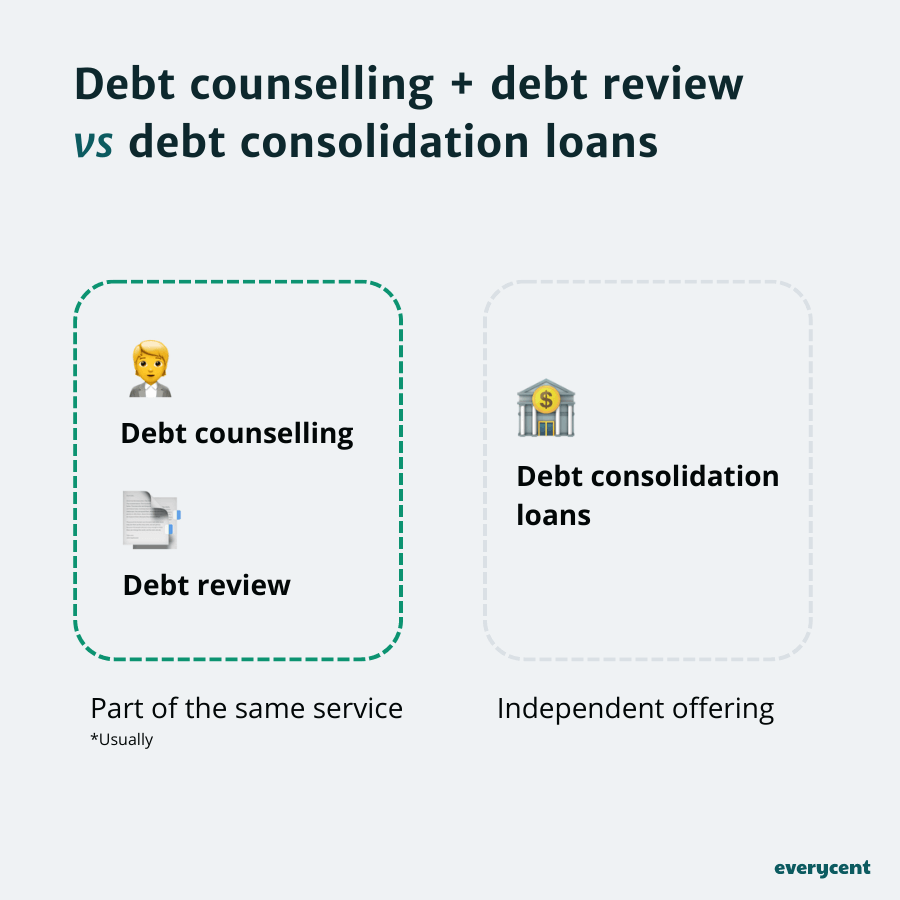Debt counselling, debt review, and debt consolidation loans all solve similar problems. But they’re not the same.
Today, we’ll compare these three debt options, get into their definitions, purpose, advantages and disadvantages, and more.
In the end, you’ll know which option is best for you — debt counselling and review (the red pill) or debt consolidation loans (the blue pill.)
Let’s get into it.
Debt counselling vs debt review vs debt consolidation loans
Learning about these three debt-related services for the first time can be confusing.
There’s a lot of overlap between them. Making it easy to mix them up.
Let’s start by defining each one before looking at where they fit in.
First up is debt counselling and debt review. At times, these two are practically the same thing, so pay close attention.
Debt counselling
Debt counselling is a service that helps over-indebted consumers (people with too much debt) to pay back what they owe.
It involves working with a debt counsellor to assess and optimise the ratio between a person’s income, expenses and debt and put legal processes in place to ensure that everyone agrees, the consumer is protected, and the debt can be repaid.
Struggling to pay your debt bills?
Check to see if you qualify to lower your debt instalment and free up money for other expenses.
Debt review
Debt review is a legal process (most debt counsellors use it during debt counselling) that offers various benefits that make it easier to repay debt.
Debt review helps debt counsellors set up better repayment terms (reduce the cost), consolidate the debt (make it easier to pay and track), and offer legal protection.
Still with us? Because debt counselling and review work together, the terms are often interchangeable.
Debt consolidation loans
Debt consolidation loans are a type of loan that consolidates (combines) multiple debts under a new loan with better terms (like lower interest rates or a lower instalment). Unlike debt counselling and debt review, debt consolidation loans don’t offer the same type of legal protection.
To summarise: Debt counselling vs debt review vs debt consolidation loans
Debt counselling is a service that uses debt review, which is a legal process, to reduce monthly debt repayments, make the debt more affordable, plus offer other benefits to over-indebted consumers.
Debt consolidation loans offer similar benefits in the form of a loan but do not provide the same level of protection and intervention.
Now, the stage is set. So let’s get into more details.

Which is better debt consolidation or debt counselling (debt review)?
The answer: It depends. Each of the options has pros and cons that play to different circumstances. Basically, the better option for you will depend on your financial circumstances.
Note that from here on out, we’ll lump debt counselling and debt review together (because the advantages and disadvantages of debt counselling [and other attributes] are so similar).
Let’s highlight the differences.
| COMPARISON FACTOR | DEBT COUNSELLING (DEBT REVIEW) | DEBT CONSOLIDATION LOANS |
| Who is it for? | People with too much debt. | People who want to consolidate their debts for better repayment terms. |
| Eligibility (who can apply) | Over-indebted individuals that are struggling to repay their debt.
Must be:
|
Individuals with multiple debts that meet the necessary creditworthiness requirements to get approved.
Must have:
|
| Process and duration | It is a formal process (regulated by the NCR) that typically lasts 3 – 5 years. | It is an informal process, similar to taking out a loan, that varies in duration (can also be several years, depending on the amount of debt). |
| Effect on credit record | Has a negative impact initially (relative to how good an applicant’s credit score is) but makes it easier to improve after debts are paid off. | Has a negative impact initially that can be rehabilitated over time. |
| Cost | Has debt counselling (debt review) fees.
Which are set by the NCR. |
Has fees and interest that are set by the lender.
*typically higher than other lenders. Do your maths first. |
| Legal protection | Offers legal protection. | No legal protection. |
| Advantages |
|
|
| Disadvantages |
|
|
If you want to learn more about the ‘restricted credit access under debt counselling (debt review), check out our post on loans for debt review clients.
Struggling to pay your debt bills?
Key takeaway
Debt counselling (debt review) and debt consolidation loans each have their place. Serving a specific purpose.
Both apply restructuring and offer new (often better in some way) repayment terms. One thing that stands out is the legal protection that debt counselling (debt review) provides. For anyone who is in or approaching hot water (creditors are constantly calling), this can mean a lot. Think—getting to keep your house or car.
On the other hand, a debt consolidation loan presents some of the same benefits (without legal protection) but does so without the formal process or credit restraints.
Final thoughts
There are many ways to take on debt that’s getting hard to manage. Debt counselling (debt review) vs debt consolidation loans puts two of the more popular options against each other, but it is a little like a split decision in boxing or a wine-tasting at your favourite wine farm. The winner depends on your perspective or your palette.
Want to learn more? Keep reading on Everycent.